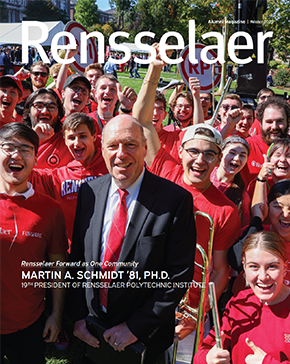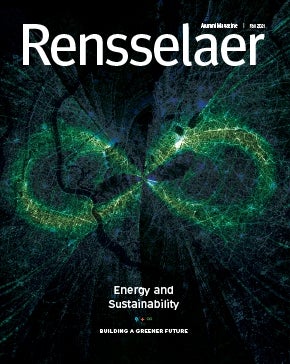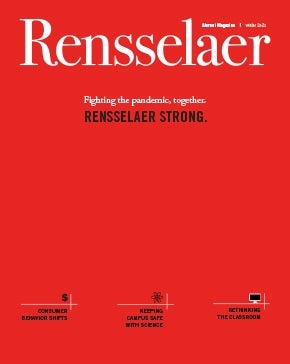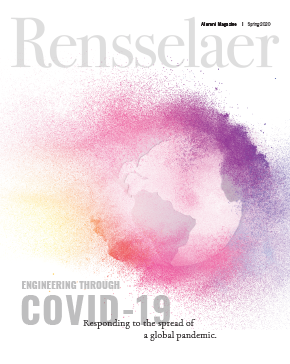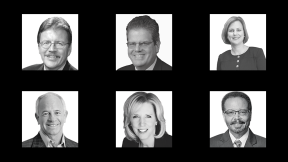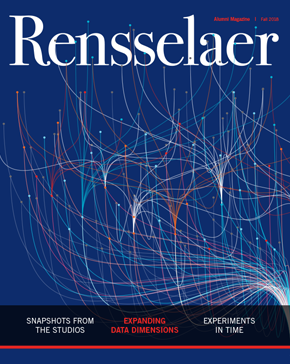
President’s Commencement Colloquy
Stirring Conversation
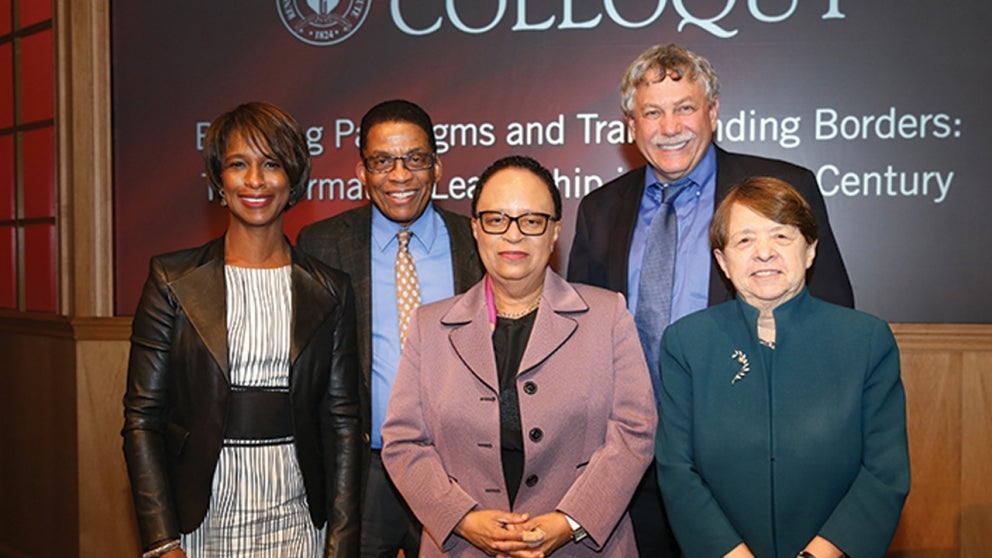
The 2018 President’s Commencement Colloquy was a lively, thoughtful discussion among innovative leaders
“I knew growing up, I liked to tinker. A teacher said, ‘you are good at math and science. You should be an engineer.’”
— Alicia Boler Davis ’98
The day before Commencement 2018, students, families, guests, and the campus community had the opportunity to listen to a fascinating, wide-ranging conversation with the Commencement honorary degree recipients, led by President Shirley Ann Jackson. The two-hour discussion covered topics ranging from music to motorcycles, to terrorism and trust, to science and social media. Four innovative leaders from the worlds of music, advanced global manufacturing, international security, and genomic science joined President Jackson at the President’s Commencement Colloquy on May 18 in the concert hall of the Curtis R. Priem Experimental Media and Performing Arts Center. The Colloquy was titled “Breaking Paradigms and Transcending Borders: Transformative Leadership in the 21st Century.”
Herbie Hancock, the legendary jazz pianist and composer, has brought forth innovations in jazz and combined a passion for engineering and science with music. Rensselaer alumna Alicia Boler Davis ’98, executive vice president of General Motors Global Manufacturing, is one of the most powerful women in global advanced manufacturing. The Honorable Mary Jo White, former U.S. Attorney for the Southern District of New York and chair of the United States Securities and Exchange Commission and, currently, senior chair at the law firm Debevoise & Plimpton, oversaw major prosecutions of international terrorists and white-collar crime. Dr. Eric Lander, president of the Broad Institute of MIT and Harvard, is a leading authority on genomic science, which has opened the door for groundbreaking innovations in disease diagnosis and treatment. He was a principal leader of the Human Genome Project.
“At Commencement tomorrow, we will offer honorary degrees to four leaders who have something important in common: a bold and original willingness to cross barriers and borders that other people would not cross, to explore the unknown, to open doors, and to shape the future,” said President Jackson. “They all are pioneers.”
President Jackson began the conversation by asking, “How did you all come to recognize your true callings and how did your initial training enable you to transform an unrelated field?”
“I got to the end of grad school and realized I love mathematics, but couldn’t see doing it for my life,” said Dr. Lander. “I wanted to do something more worldly.
“I fell in love with genetics,” he continued. “I had no plan, I just fell into it. It was a brilliant move to bring mathematics into this human genome project. I found wonderful people to work with, and interesting places.”
Hancock’s professional career in jazz began when he was still a student at Grinnell College, where he double-majored in music and electrical engineering. “I have had this curious mind as long as I can remember,” he said. “I knew if I got a degree in engineering, I would get a job. If I majored in music, I might not get a job.”
“I knew growing up, I liked to tinker,” said Boler Davis. “A teacher said, ‘you are good at math and science. You should be an engineer.’ I knew for me to stay out of trouble, I needed something challenging.”
Mary Jo White served as U.S. Attorney for the Southern District of New York, the only woman to hold that position in the 200-year-plus history of that office.
“I come from a family of lawyers,” White said. “The men, not the women. My father said what a great lawyer I’d be. I wanted to be a scientist.” She went to school for psychology, earning undergraduate and graduate degrees before turning to law school.
When President Jackson asked how has psychology helped her in the law, White responded: “Before I went to Washington to chair the SEC, my answer would have been ‘not at all.’ Once I got to Washington, it was all about psychology!”
The conversation touched upon social media amplification and consequences; the need for transparency; public trust in science, in government, and in industry; the difference between “good science” and “good people”; the evolution of jazz; and much more.
